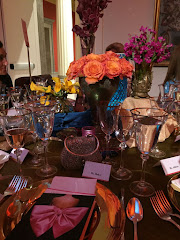Possibly you have received a wedding gift or flowers with a calling card inside and the formal name of the gift giver has one fine pen line through it and the informal name written below. The sender traditionally writes in pencil if the gift is delivered in person, and fine pen if the gift is mailed or delivered by messenger.
Maybe you have also seen these calling cards attached to the flowers on top of the coffin of an international figure in death, such as Princess Diana.
Calling cards serve other purposes in addition to merely a call. Most often today, we see them enclosed inside wedding presents, flowers, birthday and anniversary gifts, graduation gifts and condolences. Did you also know Calling cards may be sent with letters of introduction and may be sent with acceptances or regrets for informal (but never formal) social events.
Brief messages may be written on calling cards. For example, most often, one sees a message such as: "For a lifetime of happiness" or "Best Wishes" written on a calling card for a wedding. Messages written on calling cards are also still traditionally used in military and diplomatic circles to convey the appropriate message in French.
Most High School Seniors order their first box of calling cards and send them out with their graduation announcements.
A "salver" is a small tray on which calling cards, letters, cards or refreshments are placed for handing to people. Most often today, salvers are seen at auction houses or antique stores, and are usually sterling silver, nickle silver or another metal. The salver may have the family crest or monogram engraved on the face of the tray.
The following list are abbreviations used to convey traditional messages in French:
- p.p. (pour presenter) - To present, to introduce. Used only on the card of a senior officer accompanying the card of the subordinate.
- p.f. (pour feliciter) - To congratulate. Used for national holidays and other special occasions.
- p.c. (pour condoler) - To condole. To express sympathy. Used at the death of a national figure.
- p.r. (pour remercier) - To thank. Thanks for a gift, courtesy received, a congratulations. Can also be sent in response to "p.f." and "p.c." messages.
- p.p.c. (pour prendre conge) - To say good-bye or take leave. Indicates one is leaving town.
- p.f.n.a. (pour faire nouvel an) - Happy New Year. To extend greetings at the new year.
- p.m. (pour memoire) - To remind.
If the corner of the calling card is turned in, this indicates the following:
- Upper Left-hand corner - A Visit.
- Upper Right-hand corner - A Congratulations.
- Lower Left-hand corner - Taking leave.
- Lower Right-hand corner - A Condolence.
Voila! Now you are one of those in the know.









